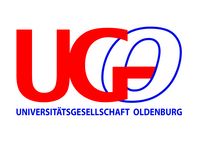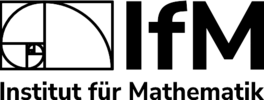Kontakt
Direktor
Geschäftsstelle
Gleichstellungsbeauftragte
Ombudsperson für Fragen der
Diskriminierung und der sexuellen Belästigung
EDV-Beauftragte
Anschrift

North German Algebraic Geometry Seminar
Spring 2024 (29.02. - 01.03.2024)
The Spring 2024 edition of NoGAGS is hosted by the Carl von Ossietzky Universität Oldenburg.
The North German Algebraic Geometry Seminar is a joint seminar of the Algebraic Geometry groups in FU Berlin, HU Berlin, Bielefeld, Hamburg, Hannover, Göttingen, Groningen, Leipzig, Münster and Oldenburg.
Lecture Room
The seminar takes place in the room W01 0-015 at Campus Wechloy. The registration is in front of this room. There are signposts leading you from the bus station directly in front of the main entrance to the lecture room.
Please be aware that the Oldenburg University has two campuses: Campus Wechloy and Campus Haarentor. The conference takes place at Campus Wechloy (Carl von Ossietzky Straße). The line 306 (direction: Universität) is the preferred way to reach the Campus Wechloy from Oldenburg central station. The bus schedule and map can be found here. A campus map is here.
Schedule
Thursday
| 13.00 – 13.30 | Registration |
| 13.30 – 14.20 | Remke Kloosterman: |
| 14.30 – 15.20 | Andrés Rojas: |
| 15.30 – 16.00 | Coffee Break |
| 16.00 – 16.50 | Fumiaki Suzuki: The integral Tate conjecture over finite fields and two coniveau filtrations |
| 17.00 – 17.50 | Johannes Krah: |
| 19.00 | Conference Dinner |
Friday
| 9.30 – 10.20 | Leonie Kayser: The geometry behind eigenvalue methods for symmetric tensor decomposition |
| 10.30 – 11.20 | Florian Wilsch: Hardy–Littlewood heuristics for affine cubic surfaces |
| 11.30 – 13.00 | Lunch Break |
| 13.00 – 13.50 | Marwan Benyoussef: Character varieties of one-relator Kaehler groups |
| 14.00 – 14.50 | Hans-Christian Graf v. Bothmer: Equivariant birational geometry of cubic fourfolds |
Abstracts for the Talks
Marwan Benyoussef: Character varieties of one-relator Kaehler groups
Abstract: We consider generalizations of infinite one-relator Kaehler groups, and compute the E-polynomials of the corresponding SL_2 character varieties. Construction of such varieties follows from Geometric Invariant Theory. We will discuss arithmetic techniques introduced by Hausel and Rodriguez-Villegas, based on a fundamental theorem of Katz. As a corollary of these computations, we will also discuss how to generalize Baraglia-Hekmati techniques to obtain topological information about the moduli space of V-Higgs bundles over an orbifold.
Leonie Kayser: The geometry behind eigenvalue methods for symmetric tensor decomposition
Abstract: In tensor decomposition the goal is to find a shortest representation of a given tensor as a sum of simple tensors. I will give an introduction to symmetric tensor decomposition and recent numerical algebraic geometry approaches to this problem. In recent work with Fulvio Gesmundo and Simon Telen we show how the study of equations for the decomposition connects to long-standing conjectures such as the ideal generation conjecture and Fröberg's conjecture on general forms.
Remke Kloosterman: Jump loci of the Picard number and the average Mordell–Weil rank of elliptic surfaces over number fields
Abstract: In this talk we first sketch how Noether–Lefschetz theory can be used to study jump loci of the geometric Mordell–Weil rank of elliptic surfaces over the complex numbers.
However, Noether–Lefschetz type results typically give rise to countably many exceptional loci, and therefore are of little use over countable fields, like $\overline{\mathbb{Q}}$.
We will use results by André and by Maulik–Poonen to give a preciser description of the jump loci of the Picard number in the case of countable fields. This allows us to determine the average (arithmetic) Mordell–Weil rank of elliptic surfaces over number fields, hereby proving a conjecture of Alex Cowan.
Johannes Krah: Phantoms and exceptional collections on rational surfaces
Abstract: A smooth projective rational surface over an algebraically closed field admits a full exceptional collection. We explain how some classification results regarding exceptional collections, previously known for del Pezzo surfaces, can be extended to the blow-up of the projective plane in 9 points in very general position. On the other hand, on the blow-up of 10 points in general position we construct an exceptional collection of maximal length which is not full. This disproves a conjecture of Kuznetsov and a conjecture of Orlov.
Andrés Rojas: On the degree of irrationality of low genus K3 surfaces
Abstract: Given a projective variety, one can understand rational maps to a projective space of the same dimension in terms of the associated kernel bundle. In the case of K3 surfaces of Picard rank 1, this allows to prove that rational maps of degree at most d (induced by the primitive linear system) move in families. I will explain how, by combining vector bundle techniques with derived category methods, one can study and characterize in many cases rational maps of minimal degree for polarized K3 surfaces of genus up to 14. This can be seen as a preliminary step towards computing the degree of irrationality of these surfaces. Joint work with Federico Moretti.
Fumiaki Suzuki: The integral Tate conjecture over finite fields and two coniveau filtrations
Abstract: We construct a new type of counterexamples to the integral Tate conjecture over finite fields, where a geometric cycle map is surjective but an arithmetic cycle map is not. We also discuss the relation of this problem with two coniveau filtrations, and show some positive results toward a conjecture of Colliot-Thélène and Kahn. This is joint work with Federico Scavia.
Hans-Christian Graf v. Bothmer: Equivariant birational geometry of cubic fourfolds
Abstract: The question which cubic 4-folds X are rational is the leading open question in birational geometry. It has been conjectured that the following are equivalent
1) X is rational
2) There exists a K3-surface S such that the Fano variety of lines of F1(X) is Hilb2(S).
3) The Kuznetsov component AX of the derived category of X is a K3-category
All known rational cubic 4-folds satisfy conditions 2) and 3).
We explore these questions in the category of G-varieties, i.e. varieties with a faithful linear action of a finite group G and G-equivariant morphisms. The notion corresponding the rationality is G-linearizibility.
In this talk I will explain the construction of a cubic 4-fold X with a finite group G acting on X that satisfies both conditions above in the category of G-varieties but is still not G-linearizable. (joint work with Yuri Tschinkel and Christian Boehning).
Florian Wilsch: Hardy–Littlewood heuristics for affine cubic surfaces
Abstract: Affine cubic surfaces are defined by an irreducible cubic polynomial f with integer coefficients in three variables, and their integral points correspond to integral roots of this polynomial. Points on such log K3 surfaces tend to be sparser and much harder to find than in cases of higher dimension or lower degree, as witnessed by the search for representations of integers k as sums of three cubes — that is, the case f = x³ + y³ + z³ - k — whose existence or nonexistence has only recently been settled for the first one hundred integers.
To shed new light on this kind of problem, we develop a Hardy–Littlewood heuristic for the number of integral points on affine cubic surfaces, arriving at a prediction depending on geometric properties of the surfaces that is similar to Manin’s conjecture. We compare this heuristic to Heath-Brown's prediction for sums of three cubes, to Zagier's count on the Markoff surface and to Baragar's and Umeda's work on variants of it, as well as to numerical data.
This is joint work with Tim Browning.
Confirmed Speakers
- Marwan Benyoussef (Freie Universität Berlin)
- Leonie Kayser (MPI MiS, Leipzig)
- Remke Kloosterman (Università degli Studi di Padova)
- Johannes Krah (Universität Bielefeld)
- Andrés Rojas (Humboldt Universität Berlin)
- Fumiaki Suzuki (Leibniz Universität Hannover)
- Hans-Christian Graf v. Bothmer (Universität Hamburg)
- Florian Wilsch (Georg-August-Universität Göttingen)
Registration
Please register by sending an e-mail (containing your last name, first name, e-mail address and affiliation) to
Milena Wrobel (milena.wrobel(at)uol.de).
Please note that we will share a list of the participants on our website. If you wish to not appear there, please let us know!
The meeting is supported by the Universitätsgesellschaft Oldenburg e.V..


